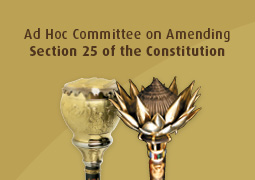
For Mr Nampo Thapelo, the amendment of Section 25 of the Constitution to allow the expropriation of land without compensation is central if South Africa is to overcome debilitating poverty and inequality. Mr Thapelo was making his contribution during the public hearings by a delegation of the Ad Hoc Committee to Initiate and Introduce Legislation Amending Section 25 of the Constitution in order to allow for the expropriation of land without compensation in Soshanguve, Pretoria.
According to Statistics South Africa’s Palma ratio, the top 10% of the population spent 8,6 times more than the bottom 40% in 2006; this ratio reduced to 7,9 in 2015. This indicates that overall inequality, measured at a national level, has declined slightly between 2006 and 2015. However, Mr Thapelo highlighted that people in his township are still experiencing the hardship of poverty and inequality on a daily basis.
“The only tool to achieve a non-racial and equal South Africa will be to amend Section 25 and give access to the majority of citizens of this country. The only instrument that will ensure that people have access to financial and economic freedom is and will remain the land,” Mr Thapelo emphasised.
A majority of residents questioned the lengthy process in amending Section 25 and suggested that Parliament was wasting tax-payer’s money in coming to the people again about their views on the amendment. The Chairperson of the Committee, Dr Mathole Motshekga, clarified that the two processes are distinct and require intensive public participation processes, as the committee and Parliament did not have a monopoly on wisdom.
“In 2018, the Constitutional Review Committee (CRC) focussed on evaluating South African citizens’ opinions on the desirability of changing Section 25 of the Constitution. That mandate was accepted by the National Assembly. Hence the establishment of this Ad Hoc Committee, which has as its focus the content of the amendment and the wording to be used hence the Constitution Eighteenth Amendment Bill,” Dr Motshekga said.
The majority of participants in Soshanguve said the amendment of Section 25 should be expedited to return land that was violently taken from their forebears. This, they claimed, is the only way of ensuring redress for decades of repressive laws and of violent dispossession.
Mr Lawrence Matsetela called for the complete removal of Section 25 (3) and an insertion of a sub-section calling for the state to be the custodian of all natural resources. “We must also privatise the air and rain, because as soon as the capitalist class find a way to privatise those and they will charge the people so that they can make profit,” Mr Matsetela said.
While there was overwhelming support for the Constitution Eighteenth Amendment Bill, there were those that were against the amendment. Mr Ernst Roets said he based his opposition of the amendment on the basis that corruption undermined the objectives of land reform programme, a process he supports fully.
“The myriad of examples of corruption that have plagued attempts to realise land reform in South Africa, especially the fact that only 6,3% of land acquired by the state has to date been transferred to private ownership. Furthermore, over 90% of those who had instituted land claims indicated that they were not interested in owning agricultural land and that they would rather prefer money as compensation. The South African government also admitted that more than 90% of farms distributed by the state to black African communities had failed and had usually reverted very quickly either to subsistence farming or to squatter camps,” Mr Roets said.
Malatswa Molepo
17 March 2020

